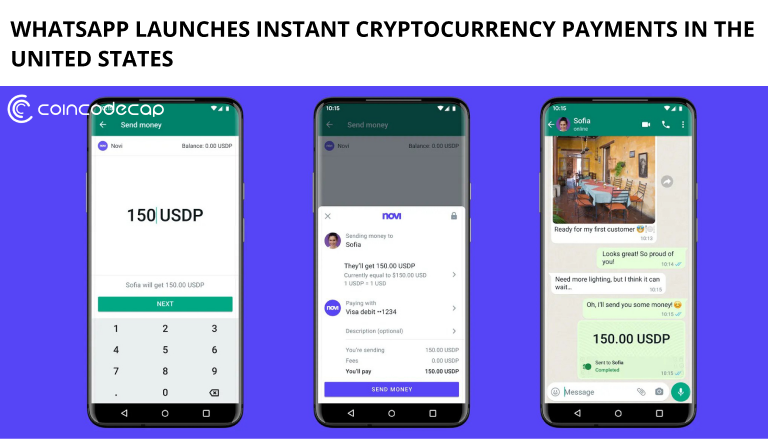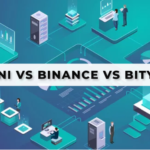Key Takeaways:
- WhatsApp Launches Instant Cryptocurrency Payments in the U.S.
- The pilot program allows users of the encrypted messaging app to send and receive money “instantly, securely, and without fees” by using the Paxos Dollar (USPD) stablecoin, pegged to the U.S. dollar.
- The small pilot program is available to some users in the U.S. from today.

Thanks to the integration of Novi, a digital wallet owned by Facebook (now Meta), WhatsApp has launched a cryptocurrency payment feature for a small number of users in the United States. The pilot program allows the encrypted messaging app users to send and receive money “instantly, securely, and without fees” by using the Paxos Dollar (USPD) stablecoin, pegged to the U.S. dollar. The small pilot program is available to some users in the U.S. from today.
Payments in WhatsApp function similarly to sending regular attachments in a conversation. Users select Payment from the menu after tapping the plus (+) icon. Users paid in this manner receive USDP, which can be withdrawn to a bank account in U.S. dollars.
There is no limit to how many times the Novi system can be used to send and receive money via WhatsApp. There are no fees associated with keeping a balance in a Novi account or withdrawing it to a bank account, regardless of frequency of use. Furthermore, Novi’s inclusion in the chat platform does not affect the end-to-end encryption of personal messages.
In October, Meta officially launched a digital currency pilot collaborating with major cryptocurrency exchange Coinbase and stablecoin firm Paxos. The pilot began in the United States and Guatemala, using Pax Dollar (USDP), a dollar-pegged stablecoin issued by blockchain trust company Paxos. The pilot results from Meta’s cryptocurrency plans, which have evolved since they were first announced in 2019. The plan back then was to create a cryptocurrency called Libra that would be linked to a Facebook digital wallet called Calibra.
However, Libra has been renamed Diem, and Calibra has been renamed Novi. Instead of using Diem, Novi has adopted the Paxos stablecoin in collaboration with Coinbase, the custody partner that holds the funds for the pilot. WhatsApp already has payment systems in India and Brazil, but they use traditional fiat currencies rather than crypto.
Despite some senators in the United States opposing Meta launching its digital currency products, the development of the social media giant’s digital wallet, Novi, continues apace. On December 8, Stephane Kasriel, the head of Meta’s cryptocurrency and fintech unit Novi, announced that Meta’s messenger subsidiary WhatsApp had begun testing transactions through Meta’s Novi wallet.
According to Stephane Kasriel, the new feature is available for a “limited number of people” in the United States, allowing users to send and receive money on WhatsApp “instantly and with no fees.” He noted that Meta has been able to test and learn which features and functionalities are “most important to people” since they introduced the Novi pilot in mid-October. He added that using Novi doesn’t affect the privacy of WhatsApp personal messages and calls, “which are always end-to-end encrypted.”
Will Cathcart, head of WhatsApp at Meta, confirmed the news on Twitter. He tweeted that some U.S. users can now send and receive money with Novi on WhatsApp.
“People use W.A. to coordinate sending money to loved ones, and now Novi will help them do that securely, instantly, and with no fees.”
The Open Markets Institute, a non-profit organization based in the United States, subsequently sent a letter to multiple regulators, including the United States Department of Justice, claiming that Meta may be “in the illegal business of receiving deposits without a bank charter.” The organization specifically stated that USDP is one of the smaller stablecoins, “with far less liquidity and usage” than top stablecoins such as Tether (USDT) and USD Coin (USDC). The Open Markets Institute letter stated that
“There are several legal and regulatory implications for Facebook’s pilot that warrant particular attention by the agencies.”









